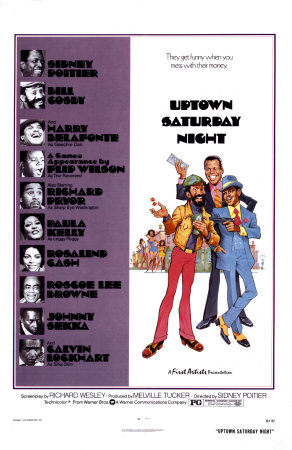
UPTOWN SATURDAY NIGHT
US, 1974, 104 minutes, Colour.
Sidney Poitier, Bill Cosby, Harry Belafonte, Flip Wilson, Richard Pryor.
Directed by Sidney Poitier.
Uptown Saturday night is very entertaining frivolity, relying on the personalities and styles of its leads and their rendition of comic gangster and robbery situations. Sidney Poitier (who directed) exercises his old charm and is well matched by Bill Cosby's quick-patterned good humour. A tour-de-force sermon by preacher Flip Wilson is excellent and there is a bonus with Harry Belafonte's clever take-off of Marlon Brando's Godfather. It is certainly an all black world (only two whites glimpsed), but with all the film's brothering and presentation of the suburban black world, delightfully suburban with home life and parish picnics, ugly criminal with slow-motion violence, it is a typical enough American comedy.
1. Why was this film enjoyable? The nature of its comic qualities? Its feeling of humanity? Its treatment of folksy attitudes and sentiments? Its enjoyment of its fantasy? Its use of sentiment and feeling in characters and from the audience? were these well-blended?
2. How important is it to see the film as a black film reflecting black ethos and pride? As a 1970's black film? The fact that only two white people were glimpsed? The role of the black man in modern American society?
3. How much did the film rely on its city background? Friends in this kind of background? The clubs and their wealth? The possibilities of crime? The portrayal of work, taxis, home-life? The role of the Church and the singers? The congregation and its personalities? Parish picnics etc.? Did the background give an authentic picture of black life of the 70's?
4. How attractive were Steve and Wardell as heroes for the film? How much warmth did they have; how was this conveyed? The personalities of Poitier and Cosby? Their differing styles? Audiences being able to identify with them? Their night on the town? Identifying with their loss and the pursuit of the lottery ticket? Their looking at the club - and the long portrayal of the style of the club? Their relationship with their wives? The quality of their adventures? Their playing tough? Their shrewdness? Their relentlessness and final success?
5. How important was the portrayal of the wives? The homely atmosphere of Steve and his wife? The importance of family life for blacks as this film showed it?
6. The portrayal of Madam Zenobia and her club? As a portrayal of black affluence in modern America? The gambling, the style?
7. The point of the satire with sharp-eyed Washington? The humour of the set pieces? The irony of their being conned?
8. The satire of the portrayal of Congressman Lincoln - and his white image and black image? His surface integrity of the revelation of Mrs Lincoln? The satire on political talk?
9. The character of Mrs. Lincoln - her enthusiasm at the club her relationship to her husband, her easiness in helping Steve and Wardell?
10. Why was the sequence in the bar with the little crook and his big guard so humorous? Bill Cosby's style of storytelling? Hitting on Poitier? The humour of the fight yet its violence? Was this successful comedy filming?
11. How humorous was the portrayal of Buford? Harry Belafonte’s impersonation of grandiose godfather? The criminal character in himself? His greed? His attitude towards the two heroes? The realities of the shoot-ups?
12. The personality of Silky Sam? The suave negro cook? The deals? A touch of reality to balance Buford? Blacks joking about their own criminals?
13. How important was Flip Wilson's featuring in the film? His early scene and the discussion of drink? The congregation and its responses? The Choir? How successful as comedy was his sermon about loose lips? The humour and the point? The vitality of Wilson? The irony with the situation?
14. How attractive was the picnic sequence? The criminals enjoying the baseball, sack races etc? The change of atmosphere with the arrival of the police? The nature of the chase with its emphasis on Poitier and the car rather than just speed? The spectacular falls into the river?
15. How important an example of black, humour was this film? Its goal, dialogue and situations, How important as portraying a black situation with humanity? The values that it stood for?